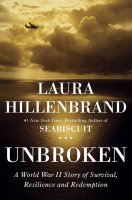 Unbroken by Laura Hillenbrand (Random House, 2010)
Unbroken by Laura Hillenbrand (Random House, 2010)
There are math prodigies. There are music prodigies. And then there is Louis Zamperini, who can only be called a survival prodigy.
Read the Unbroken before the movie comes out. Not that I know anything bad about the upcoming film, but I do know that movies have a track record of focussing on the action while missing the subtleties. Not that there aren't subtleties I'd rather have missed.
To summarize the story of Zamperini—Olympian, WWII pilot, prisoner of war—might give away too much. You could read the Wikipedia article, but I don't recommend it. Let Laura Hillenbrand be the storyteller; she does the job remarkably well.
One caveat: Although I recommend Unbroken highly—it is a remarkable story, horrifying and wonderful—I'm not sure about recommending it to anyone with an active, visual imagination. I'm not one who visualizes what I read well, as I'm usually in too much of a hurry to get on with the story. But evil images can make an impression in a flash, and one particular incident haunted me for days. It still does, though I'm getting better at banishing it when it intrudes. I certainly can't recommend the book to grandson Jonathan, for example, though it's well within his reading ability and would give him important insights into World War II, the clash of cultures, the depths of evil, and the power of grace. It would also scar his young soul. As an aunt, I'm even reluctant to encourage our nephews to read Unbroken, but I have to realize that, being teens and older, their souls have probably already been scarred. Certainly several of them are old enough to have been in the story had they lived at that time, which is another reason it's hard to read.
Three observations that should not be spoilers:
- As a child, Louis Zamperini could only be called a juvenile delinquent, despite a reasonably happy family life. The traits that made him so were apparent even when he was a toddler, though they were exacerbated by problems at school. It's clear that these same characteristics also drove him to be an Olympic athlete, a war hero, and a survivor in unspeakably brutal conditions. In a society where unruly children are routinely drugged into compliance, where they have no acceptable outlet for their wild energies, where their natural talents are quashed rather then channelled—where will our heroes come from when we need them?
- The brutality of the Japanese prison camp personnel was almost beyond belief. Take a generation or two of any society: abuse them physically and mentally, daily and as a matter of course, in school and in the military; teach them that surrender and capture are the ultimate in shame and degradation; above all, fill them with the certainty that they and their people are vastly superior to all other beings ... and then put the dregs of that society, the failures, and the mentally ill in charge of the prison camps. What is astonishing is not the consequences, but how quickly they come to fruition.
- Despite seeming evidence to the contrary, good is vastly more powerful than evil.
Oh no! I'd so love to read the story, but my mind is not so good as yours to be able to banish strong images in a matter of days! What to do . . .
I don't know. Of course I immediately thought of you and the way you read. I'm inclined to say it's too good a story to miss. I could tell you how to skip the part that affected me the most, but that might not at all be what would bother you. Perhaps Stephan could read the book first and give you his judgement.


